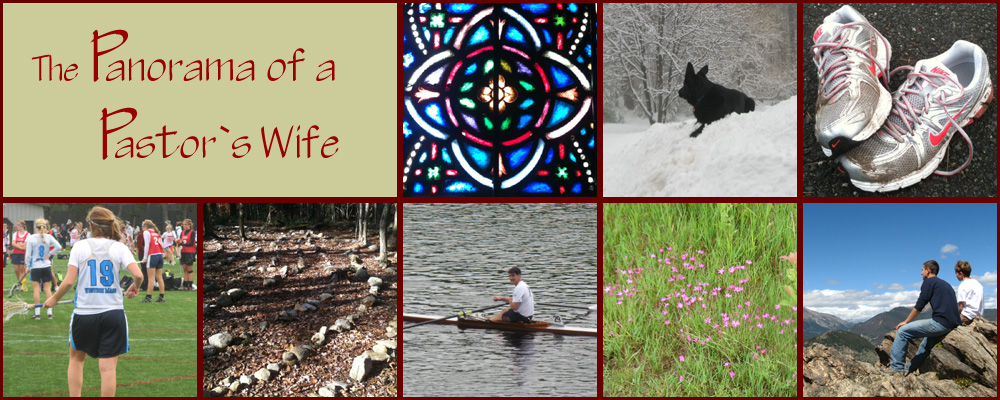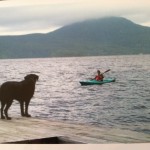Take Me to the River…or the Stream, or the Pond
Driving back from early evening tennis a few towns over, I saw the sun hanging low over the rolling New Hampshire fields—still glorious, as if darkness weren’t right on its heels. Going to the pond would mean taking a significant detour from my route and then, after parking, hoofing it under the highway and over to the water. I briefly considered doing the sensible thing: heading home for a shower before joining my family for dinner. But that was really out of the question: on this perfect summer evening when the air was glimmering with possibility, only a swim would do.
This steamy week has been one steady reminder of how much ponds, rivers, lakes do to help replenish both our physical and spiritual selves. The salted water version I’ll leave to my friends on the beaches, but I suspect – and remember, having grown up on Long Island Sound– that it works pretty much the same way there too. And I celebrate the virtues of immersion in water even though the Christian rite of baptism (in truth, the sprinkling water kind, not the all-in kind) is something I’ve watched happen repeatedly through my years of marriage but never directly experienced.
Not that I would necessarily recall the feeling of water being sprayed over me when I was a baby. I can’t even remember when I learned for the first time that my four brothers and I were “un-christened”—no, that can’t be the right term; since we weren’t a churchgoing family, we simply had not participated in this, or really any other, rite of Christian initiation. My parents never explained why we were on a different track; I guess they didn’t feel the need to. We just went merrily along our way. Naturally, when I started keeping company with a man who was preparing to become ordained, the topic did come up for some scrutiny. Previously, I sometimes felt unusual for an array of other nothing-to-do-with-religion reasons. During those days of courtship, however, I began to see my family, and me within it, from a completely new kind of angle. Holy cow! We were outsiders, and not just because we spent a whole lot of time outside! At first, this really made me squirm. Ultimately, though, the unaccustomed viewing really wasn’t so bad and even became kind of illuminating. Some years later, I even got to start this blog. Nowadays, I can see a baptismal font (it was lying around not being used, I promise) right in own back garden, gleaming amidst the greenery.
Christian initiation. My parents never explained why we were on a different track; I guess they didn’t feel the need to. We just went merrily along our way. Naturally, when I started keeping company with a man who was preparing to become ordained, the topic did come up for some scrutiny. Previously, I sometimes felt unusual for an array of other nothing-to-do-with-religion reasons. During those days of courtship, however, I began to see my family, and me within it, from a completely new kind of angle. Holy cow! We were outsiders, and not just because we spent a whole lot of time outside! At first, this really made me squirm. Ultimately, though, the unaccustomed viewing really wasn’t so bad and even became kind of illuminating. Some years later, I even got to start this blog. Nowadays, I can see a baptismal font (it was lying around not being used, I promise) right in own back garden, gleaming amidst the greenery.
Among the books on my bedside table is a slim volume called Being Christian: Baptism, Bible, Eucharist, Prayer by Rowan Williams, Archbishop of Canterbury from 2002- 2012. There’s some slightly racier reading there too, don’t worry. “Oh good,” I thought when I first spotted it, probably on my husband’s desk. “This is the kind of straight-to-the-point thing that is bound to help me out.” It’s under 100 pages and is divided up, conveniently, into four chapters based on what the title promises. Early in the “Baptism” chapter, there is this passage:
So, the beginning of Christian life is a new beginning of God’s creative work. And just as Jesus came up out of the water, receiving the Spirit and hearing the voice of the Father, so for the newly baptized Christian the voice of God says, ‘You are my son/daughter’, as that individual begins his or her new life in association with Jesus. (p.3)
Hmm. I guess for someone like me, who somehow bypassed this moment, there was no voice of God telling me I’m part of the family. Upon reflection, this was a tad troubling. Was I or was I not living my life “in association with Jesus”? How much did this matter? Since my parents are gone now, I’m not sure what they would have to say about it. And my dog Rocky, he was no help in this department either, flinging himself in bodies of water any chance he got.
But then I kept reading and found this passage just a little further on.
To be able to say, ‘I’m baptized’ is not to claim an extra dignity, let alone a sort of privilege that keeps you separate from and superior to the human race, but to claim a new level of solidarity with other people. It is to accept that to be a Christian is to be affected—you might even say contaminated—by the mess of humanity. This is very paradoxical. Baptism is a ceremony in which we are washed, cleansed and re-created. It is also a ceremony in which we are pushed into the middle of a human situation that may hurt us, and that will not leave us untouched or unsullied. (p.6)
The plot thickens here, doesn’t it? You get baptized to be refreshed, and you’re singled out and applauded during the ceremony; then you end up getting all hot and sweaty and dirty, jostling around with other subway riders, anyway! I tell you, sometimes the way these Christian leaders describe their faith, things seem to spin around in circles.
 The part I think I really do understand, though, is how we need to “claim a new level of solidarity with other people.” Then again, I’m not so sure how much of it would necessarily be “new”— I know plenty of folks who have been quietly living like this all along. But the point about not staying away from parts of the human experience that are hard or painful or simply other than our own— that I get. After all, we’re all in a kind of continuous stream, rocks and all.
The part I think I really do understand, though, is how we need to “claim a new level of solidarity with other people.” Then again, I’m not so sure how much of it would necessarily be “new”— I know plenty of folks who have been quietly living like this all along. But the point about not staying away from parts of the human experience that are hard or painful or simply other than our own— that I get. After all, we’re all in a kind of continuous stream, rocks and all.
I thought I might be all by myself at the pond the other evening, even briefly considered the risks of swimming alone as the light faded. But I needn’t have worried: there were a couple of clusters of people still there, whooping it up even. Diving in felt every bit as good as I had expected, and I stretched out my strokes, pretending for a moment that I could just keep going and become part of the cool water, leaving any possibility of earthly contamination far behind. Soon, though, it was time to get back; after all, my family would be wondering about me. Wouldn’t they?





Polly, So nice to see you on Wednesday. Remember us to Rob.
Barbara